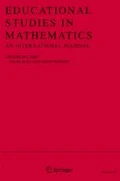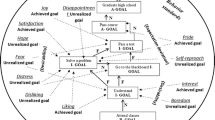Abstract
This article suggests a new framework for analysing attitude and changes in attitude. After reviewing relevant findings in the field of psychology of emotions, the author will provide a new conceptualisation for attitude. Four different evaluative processes are identified as aspects of attitude: emotions aroused in the situation, emotions associated with the stimuli, expected consequences, and relating the situation to personal values. The usefulness of this analytical framework will be illustrated with an exemplary case study. An ethnographic case study of Rita, a lower secondary school student, will be analysed. The case study will describe her negative attitude towards mathematics, and then examine how negative emotions developed during problem solving situations. Within half a year her attitude towards mathematics changed dramatically to more positive.
Similar content being viewed by others
REFERENCES
Bereiter, C. and Scardamalia, M.: 1996, 'Rethinking learning', in D.R. Olson and N. Torrance (eds.), The Handbook of Education and Human Development; New Models of Learning, Teaching and Schooling, Blackwell, London, pp. 485–513.
Boaler, J.: 1997a, Experiencing School Mathematics. Teaching Styles, Sex, and Setting, UK: Open University Press.
Boaler, J.: 1997b, 'Reclaiming school mathematics: the girls fight back', Gender and Education 9, 285–305.
Boaler, J.: 1998, 'Open and closed mathematics: student experiences and understandings', Journal for Research in Mathematics Education 29, 41–62.
Buck, R.: 1999, 'The Biological Affects: A Typology', Psychological Review 106(2), 301–336.
DeBellis, V.A. and Goldin, G.A.: 1997, 'The affective domain in mathematical problem solving', in E. Pehkonen (ed.), Proceedings of the 21st Conference of the International Group for the Psychology of Mathematics Education, Vol. 2, University of Helsinki, Lahti, Finland, pp. 209–216.
Di Martino, P. and Zan, R.: 2001, 'Attitude toward mathematics: some theoretical issues', in M. van den Heuvel-Panhuizen (ed.), Proceedings of the 25th Conference of the International Group for the Psychology of Mathematics Education, Vol. 3, Freudenthal Institute, University of Utrecht, Utrecht, the Neatherlands, pp. 209–216.
Eagly, A.H. and Chaiken, S.: 1993, The Psychology of Attitudes, Harcourt Brace College Publishers, London.
Frost, L.A., Hyde, J.S. and Fennema, E.: 1994, 'Gender, mathematics performance, and mathematics related attitudes and affect: a meta-analytic synthesis', International Journal of Educational Research 21, 373–385.
Guba, E.G. and Lincoln, Y.S.: 1994, 'Competing paradigms in qualitative research', in N.K. Denzin and Y.S. Lincoln (eds.), Handbook of Qualitative Research, Sage, Thousand Oaks, California, pp. 105–117.
Haladyna, T., Shaughnessy, J. and Shaughnessy, J.M.: 1983, 'A causal analysis of attitude toward mathematics', Journal for Research in Mathematics Education 14, 19–29.
Hannula, M.S., Malmivuori, M.-L. and Pehkonen, E.: 1996, 'Research project: development of mathematical beliefs', in E. Pehkonen (ed.), Current State of Research on Mathematical Beliefs; Proceedings of the MAVI-3 workshop; August 23-26, 1996, Research report 170, Department of Teacher Education, University of Helsinki, pp. 39–48.
Hannula, M.S.: 1998a, 'Teacher as an enactivist researcher', in M. Hannula (ed.), Current State of Research on Mathematical Beliefs: Proceedings of the MAVI-5 Workshop, Research report 184, Department of Teacher Education, University of Helsinki, pp. 23–29.
Hannula, M.S.: 1998b, 'That was really stupid. You don't need such in life”', in G. Törner (ed.), Current State of Research on Mathematical Beliefs VI; Proceedings of the MAVI Workshop, University of Duisburg, March 6.-9., 1998, Schriftenraiche des Fachbereichs Mathematik, SM-DU-404, Gerhard-Mercator-Universität Duisburg Gesamthochschule, Germany, pp. 27–32.
Hannula, M.S.: 1998c, 'Changes of beliefs and attitudes', in E. Pehkonen and G. Törner (eds.), The State-of-Art in Mathematics-Related Belief Research; Results of the MAVI Activities. Research report 184, Department of teacher education. University of Helsinki, pp. 198–222.
Hannula, M.S.: 1998d, 'The case of Rita: “Maybe I started to like math more.”' in A. Olivier and K. Newstead (eds.), Proceedings of the 22 nd Conference of the International Group for the Psychology of Mathematics Education. Vol 3, University of Stellenbosch, South Africa, pp. 33–40.
Hannula, M.S.: 1998e, 'That must have been the nicest thing exactly that one understands the topic!' in T. Breiteg and G. Brekke (eds.), Theory into practice in Mathematics Education; Proceedings of Norma 98 the Second Nordic Conference on Mathematics Education, Agder College, Norway, Research Series No. 13, pp. 147–152.
Hannula, M.S.: 2000, 'Mathematics, emotions, and math attitude - two case studies' in K. Hag, I. Holden and P. van Marion (eds.), Handling bak ordene; Artikler om jenter og matematik [Actions behind words; Articles about girls and mathematics], Norway, Trondheim: Norges teknisk-naturvitenskaplige universitetet, pp. 75–92.
Hannula, M.S.: 2001a, 'Intimacy and self-defence in problem solving', in E. Pehkonen (ed.), Problem Solving Around the World; Proceedings of the Topic Study Group 11 (Problem solving in mathematics education) at the ICME-9 meeting August 2000 in Japan, University of Turku, Faculty of Education, Report series C:14, pp. 67–73.
Hannula, M.S.: 2001b, 'The metalevel of emotion-cognition interaction', in M. Ahtee, O. Björkqvist, E. Pehkonen and V. Vatanen (eds.), Research on Mathematics and Science Education. From Beliefs to Cognition, from Problem Solving to Understanding, Institute for Educational Research, University of Jyväskylä, pp. 55–65.
Hannula, M.S.: In print, 'A case study of two students' belief systems and goal systems in a conflict over teaching methods', Proceedings of Norma 2001 conference, 8 p.
Hannula, M.S.: Forthcoming. '“So I changed my attitude” A case study of attitude and its development', A presentation held at the annual meeting of 'Matematiikan ja luonnontieteen opetuksen tutkimusseura' [the Finnish society for research on mathematics and science education] in Tampere 28.9.-29.9.2001.
Hembree, R.: 1990, 'The nature, effects, and relief of mathematics anxiety', Journal for Research in Mathematics Education 21, 33–46.
Isoda, M. and Nakagoshi, A.: 2000, 'A case study of student emotional change using changing heart rate in problem posing and solving Japanese classroom in mathematics', in T. Nakahara and M. Koyama (eds.) Proceedings of the 24th Conference of the International Group for the Psychology of Mathematics Education Vol. 3, Hiroshima, Japan, pp. 87–94.
Lazarus, R.S.: 1991, Emotion and Adaptation, Oxford University Press, New York, Oxford.
Leder, G.: 1995, 'Equity inside the mathematics classroom: Fact or artifact?', in W.G. Secada, E. Fennema and L.B. Adajian (eds.), New Directions for Equity in Mathematics Education, Cambridge University Press.
Ma, X. and Kishor, N.: 1997, 'Assessing the relationship between attitude toward mathematics and achievement in mathematics: A meta-analyses', Journal for Research in Mathematics Education 28(1), 26–47.
Mandler, G.: 1989, 'Affect and learning: Causes and consequences of emotional interactions', in D.B. McLeod and V.M. Adams (eds.), Affect and Mathematical Problem Solving; A New Perspective, Springer-Verlag, New York, pp. 3–19.
McLeod, D.B.: 1992, 'Research on affect in mathematics education: a reconceptualization', in D.A. Grouws (ed.), Handbook of Research on Mathematics Learning and Teaching, MacMillan, New York, pp. 575–596.
McLeod, D.B.: 1994, 'Research on affect and mathematics learning in the JRME: 1970 to the present', Journal for Research in Mathematics Education 24, 637–647.
Power, M. and Dalgleish, T.: 1997, Cognition and Emotion; From order to disorder, Psychology Press, UK.
Reid, D.: 1996, 'Enactivism as a methodology', in L. Puig and A. Gutièrrez (eds.), Proceedings of the 20th Conference of the International group for the Psychology of Mathematics Education, Vol. 4., pp. 203–210.
Ridlon, C.L.: 1999, 'How a problem centered curriculum enhanched the learning of low acheivers', in F. Hitt and M. Santos (eds.), Proceedings of the Twenty First Annual Meeting of the North American Chapter of the International Group for the Psychology of Mathematics Education, Vol 2., ERIC Clearinghouse for Science, Mathematics, and Environmental Education, Columbus, OH, pp. 582–587.
Ruffell, M., Mason, J. and Allen, B.: 1998, 'Studying attitude to mathematics', Educational Studies in Mathematics 35, 1–18.
Solar, C.: 1995, 'An inclusive pedagogy in mathematics education', Educational Studies in Mathematics 28, 311–333.
Williams, J.M.G., Watts, F.N., MacLeod, C. and Mathews, A.: 1988, Cognitive Psychology and Emotional Disorders, Wiley, Chichester, UK.
Author information
Authors and Affiliations
Rights and permissions
About this article
Cite this article
Hannula, M.S. Attitude towards mathematics: emotions, expectations and values. Educational Studies in Mathematics 49, 25–46 (2002). https://doi.org/10.1023/A:1016048823497
Issue Date:
DOI: https://doi.org/10.1023/A:1016048823497




